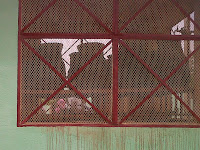Yesterday evening as we teachers sat outside the classrooms,
supervising the boarders’ study time as we do every evening, Osman told me
about the difficulties the school faces.
I had mentioned the lack of scientific equipment and computers to him. He said that, yes, this was a major
problem. However, the worst is the
constant struggle to keep the students physically healthy. He said that if there is any way I can find of
getting outside help it would be greatly appreciated.
When Osman became headteacher the school expected to send
around 10 students a day to hospital due to malaria, drinking contaminated
water or eating bad food. There was no
plumbing for waste water (including the toilets) so that it all drained into
the ground making for wet and insanitary conditions, ideal for mosquitoes to
breed. The kitchens were old, dirty,
unventilated and had no fans. The dining
tables were filthy.
 |
Zeer in their new contamination free shed
|
All these problems have been rectified. The ‘zeer’ (traditional earthenware pots
containing water) are now in a covered area to avoid contamination, with pipes
leading to drinking water taps. The
water still comes direct from the Nile, but this is a problem which is expected
to change soon because the government is currently building a water treatment
plant for the town. Even so, it is now much
rarer to send students to hospital for this reason. The kitchens have been re-decorated, fans
installed and new dining tables (regularly cleaned) purchased.
 |
| Girls drink at the drinking water taps |
The next headache is that there is insufficient water for
the size of the school. Osman has found
that the work needed to increase the water supply will cost S£20,000 (UK£2,800
or US$4,534) which is a very daunting amount in a rural third world town such
as Ed Damer.
Because of the political relationships with the outside
world including US sanctions, and the relentlessly bad press Sudan receives in
the western media, there are difficulties getting outside help. However, no matter what a country’s politics,
it is deeply unjust that the children should suffer.
The girls at Ed Damer High School work in bare classrooms
sitting on uncomfortable broken chairs at rickety desks, often three students
to a small desk. As I said before, there
is no scientific equipment or access to computers. All work is therefore textbook or
blackboard-based.
Yet in spite of all the problems of their environment, students
here are incredibly positive, cheerful and hardworking. It is rare to see a glum face. Again and again they tell me how they want to
become doctors or travel abroad and see the world.
Today, the English exam was in progress. There is one blind girl at the school. In order for her to sit her exams, a teacher
has to read out the questions and scribe the answers for her in a room with
constant interruptions. In a just world
this girl should have the same access to Braille resources as her UK peers, and
of course the same opportunities.
I think the school does a terrific and very conscientious
job under difficult circumstances. Time
for some help from elsewhere, don’t you think?
 I was told that the main visitors to the museum are school
groups and tourists. Tourists? What tourists? I think that, like statements I hear about
passenger trains and postal services, this is a figment of a wished-for Sudan,
rather than the reality. This is a great
shame as there is so much to see, whether it is camel markets, the River Nile
in its unspoilt loveliness, deserts, and of course, the wonderful
archaeological sites. Not to mention meeting
the people themselves, who are the soul of hospitality.
I was told that the main visitors to the museum are school
groups and tourists. Tourists? What tourists? I think that, like statements I hear about
passenger trains and postal services, this is a figment of a wished-for Sudan,
rather than the reality. This is a great
shame as there is so much to see, whether it is camel markets, the River Nile
in its unspoilt loveliness, deserts, and of course, the wonderful
archaeological sites. Not to mention meeting
the people themselves, who are the soul of hospitality.



 I was told that the main visitors to the museum are school
groups and tourists. Tourists? What tourists? I think that, like statements I hear about
passenger trains and postal services, this is a figment of a wished-for Sudan,
rather than the reality. This is a great
shame as there is so much to see, whether it is camel markets, the River Nile
in its unspoilt loveliness, deserts, and of course, the wonderful
archaeological sites. Not to mention meeting
the people themselves, who are the soul of hospitality.
I was told that the main visitors to the museum are school
groups and tourists. Tourists? What tourists? I think that, like statements I hear about
passenger trains and postal services, this is a figment of a wished-for Sudan,
rather than the reality. This is a great
shame as there is so much to see, whether it is camel markets, the River Nile
in its unspoilt loveliness, deserts, and of course, the wonderful
archaeological sites. Not to mention meeting
the people themselves, who are the soul of hospitality. Meroitic lion (similar to some I saw at the Royal City)
Meroitic lion (similar to some I saw at the Royal City)






















